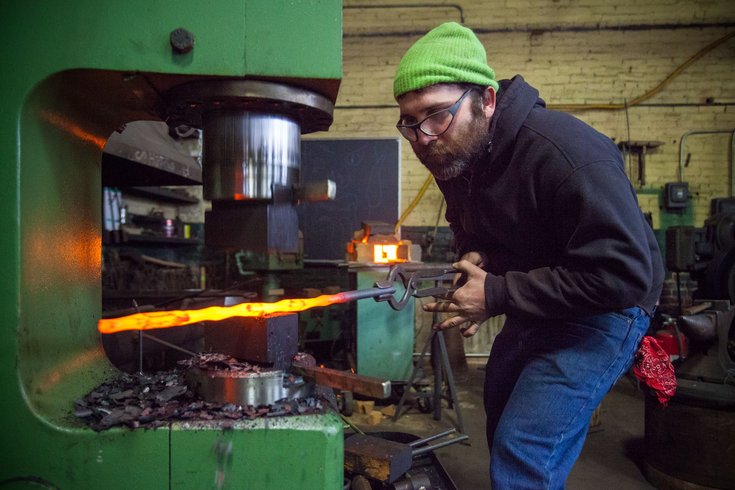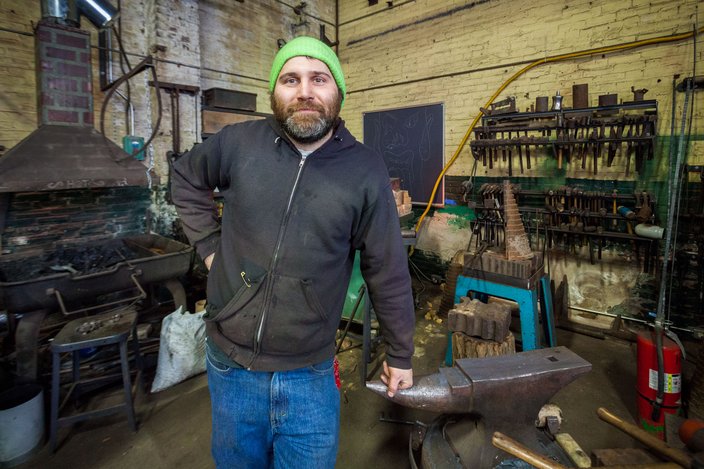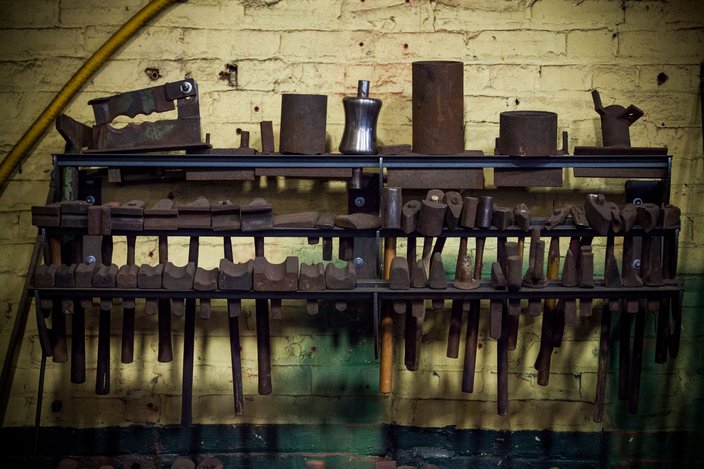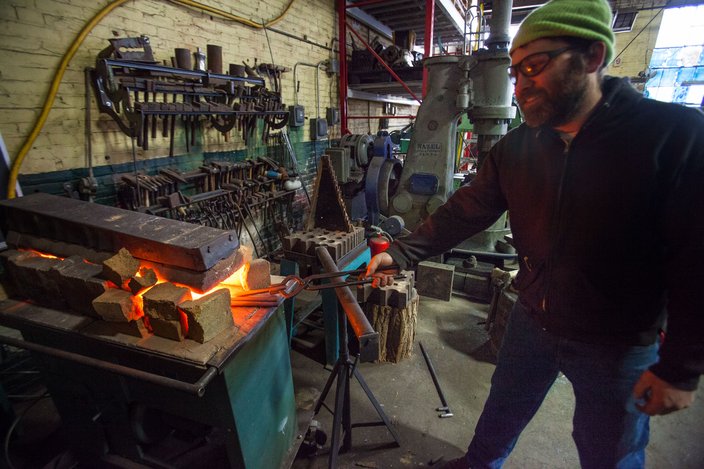
January 08, 2015
 Thom Carroll/for PhillyVoice
Thom Carroll/for PhillyVoice
Jason Roberts bends and twists a railing piece with his forge equipment.
"I want to make something that will outlast me," Roberts told PhillyVoice.com. "My office cabinet, it's full of odds and ends -- the oldest probably dating back to the mid-18th century. I want to create an object someone will care about; the furniture I make for clients, that's something that will get passed on to another generation."
That said, Roberts' metal workshop is best known for crafting and co-designing a collection of very public metal heirlooms -- ones that are hardly in-the-family hand-me-downs. In 2008, he built Silk City's by-now-iconic beer garden: the dark and squiggly railings that look plucked from "The Nightmare Before Christmas," an assortment of miscellaneous bar decor and the octopus gate that salutes passersby at the corner of Fifth and Spring Garden streets.
"Someone told me the double-decker tour buses have started going by it -- that made me happy," Roberts said.
The idea for the garden was that of Silk City and North 3rd owner Mark Bee, though Roberts clarifies -- not boasts, mind you -- that he did "90 percent" of the building himself, as well as some improvisational designing. It was his first major project as a single-person metalwork company in 2008, then based out of a cramped studio space at Globe Dye Works in Frankford.
Now he's at it again for Bee, further hammering his metalwork into Philly's bar history this month with Bee's latest establishment, Frankie Bradley's, set to open in mid-January at 1320 Chancellor St. (aka, the old Sisters Nightclub location). The goal, Bee says, has been to bring some of the "cool" of Northern Liberties to Center City -- with Jason being a big part of that lofty attempt.
"The thing about Jason, is even though he's an artist, he's willing to work with your vision. A lot of times, you'll tell an artist your vision and they'll be like 'Yeah, yeah,' and come back with something and you say, 'What the hell is that?'" Bee told PhillyVoice.com. "Jason really cares; he'll make a prototype, and invite me over to the shop to see what he's doing and how he's doing it, and that means so much to me."
For the space, Roberts built a small stage, railing for the bar's upstairs nightclub, curved and bent handrails for the doors and a twisted-metal pole with hand-forged feet for the awning.
Roberts has been assembling these pieces of ornamental architecture from his cavernous 8,300-square-foot warehouse space (formerly home to John Komada Wire Company) at 2331 Duncan St.; which, despite the plentiful space, feels a bit like stepping into an episode of "Hoarders," given how much equipment he's accumulated. Roberts saids his company, Jason Roberts MetalWorks, LLC, tackles a 50-50 split of private and commercial metalwork each year, attracting more than 70 clients. Among the company creations: railings, high-end retail displays, furniture, fireplace walls and metal fixtures that run the gamut for clients across the region, the country and the globe -- 60 percent of his work, in fact, gets shipped out-of-state or abroad. He's also picked up two full-time employees and one part-timer along the way, with year-over-year growth at an estimated 30 percent. His 2015 lineup of work, he says, includes "big contracts" (he's mum about particulars, but promises they're biggies) that elicit a coy smile. In short: Things are on the up-and-up at Jason Roberts MetalWorks.
Still, Roberts' journey to present day has hardly been an overnight build.
In 2007, Roberts returned to Philadelphia (he's from Montgomery County) to start his own business after a two-year stint as a worker at Medwedeff Forge & Design in Murphysboro, Ill. Understand this: Roberts is resourceful. He never lost the financial ingenuity he tapped into as a child of limited monetary means in a single-parent household or as a poor college kid at Kutztown University, where he studied fine arts until 2003. He popped in and out of auction sales for years, anticipating that at least one piece of metalwork equipment worth $1,500 or more would be on sale for $200 or less -- chump change, by metalwork standards. He'd store those pieces in his mom's garage and, after eight years of making bargain-bin purchases and chucking them in his mom's makeshift storehouse, it allowed him to open a metalwork shop debt-free -- during a recession, no less.
"I figured if I started going to sales at 20, then 10 years later I'd have paid cash, not have the debt and would have most of what I need [to open a shop]," he said. "And it was hard to do; I didn't exactly have the money to stay out as late at bars as some of my friends did."
He also didn't plan to launch his business at the onset of an economic disaster, but the timing proved somewhat serendipitous: As metal shop after metal shop closed -- Philadelphia's "Metalsmith Drought," as he calls it -- a void was left behind. Abandoned clients were low-hanging fruits, and premium-grade equipment was being auctioned off for a fraction of their value. As a result, Roberts said he has accrued enough equipment to have "the best-equipped shop for 50 miles."
"Jason's capabilities are a lot larger than his square-footage," Jesse Robinson, a former coworker of Roberts at Medwedeff Forge & Design, told PhillyVoice.com. "He's no factory, with hundreds or thousands of employees, but he's still probably one of the bigger shops I've been in as far as doing the type of work we do."
Among the goodies: a fully equipped blacksmith shop, a 50-ton ironworker, metal spinning lathes, a full fine metals studio, thermal spray welders and hydraulic presses that are up to 150 tons.
"I know I could hit the ground running when I started my business [as a result of having all this equipment]," Roberts says. "I didn't have the best-equipped shop at the time, but I had enough to be versatile."
The versatility of his shop has allowed him to work projects that "larger" metalwork operations might otherwise be tasked with: He's built TV and film sets -- notably, for "Paranoia" and "After Earth," the latter he took on after another Philly metalwork shop botched the project. He's also built museum podiums (New York's Museum of Mathematics) and, of course, projects for local businesses.
"I visited his shop in August, and it's amazing. Every time I go there he's added new equipment, or moved things around. It's a wonder of industry," John Medwedeff, who's been in metalworking for three decades and formerly employed Roberts as a "journeyman," told PhillyVoice.com. Medwedeff paints Roberts as a sort of Superman of the community -- a "creative force," he said, who can do the type of jobs others won't touch. "If Jason does something, it's going to be [done] right ... "
But it's not all movie sets and museum work; nor has Roberts gotten to the point where he's jaded by his capability. Case in point: When a neighborhood resident walked in his shop with a broken door -- a fixer-upper of the simpler variety, one that's the equivalent of repairing a broken watch at a mall kiosk -- and asked Roberts to repair it, he didn't turn him away.
"He asked me how much I wanted for the work, and I was like, 'I don't know. Do you have $10?" Roberts said. "You know, it's not like it takes very long. And that sort of thing, my business has all been word of mouth -- having a good reputation has been the biggest asset of the business. Just being viewed as a ... you know, good dude."
"Thing is, as metalworkers, we're not really a blue-collar or white-collar mold, and as artists, you're not restricted to being in a stereotypical social class. You can sort of meander through the 'social strata,' if you will, and create relationships with patrons of the arts and people who are financially fortunate and people who are welders, truck drivers -- the whole spectrum of humanities. And that's a common thread in our world -- for Jason, even."
"Jason's very old-fashioned that way," Robinson said. "A lot of it's the way he was raised, but it's also the trade -- you have to be that way to make it in this trade. You have be hard-working and good-willed."
"And if you're not," he says, "you're closing your doors within two years."
To that end, Roberts is of a lost breed: He's a gruff, scruff-'n'-scraggle lumberjack of a man who greets and firm-shakes you with dirtied hands, a torn shirt and a disheveled red cap and still manages to come off as being as charming as the guy in a suit. And that's his selling line, both as an individual and a businessman trying to grow his business in a city thought to have left industries like metalworking at the side of the highway: He's hard-working, humble (he doesn't care that many of his clients contractually won't allow him to take credit for work he's done) and has a crack-a-tooth exterior with a Tootsie Roll of a center. (He tears up when discussing the ways his mother -- a single mom who made due with a prison guard's salary -- helped him while he was just starting his business; she passed away from pancreatic cancer early last summer.)
At 34, he puts a new-generation face on blue collar in the same way locales like Silk City have revamped the concept of a diner -- in which case, he perhaps warrants a new label altogether.
"Thing is, as metalworkers, we're not really a blue-collar or white-collar mold, and as artists, you're not restricted to being in a stereotypical social class," Medwedeff said. "You can sort of meander through the 'social strata,' if you will, and create relationships with patrons of the arts and people who are financially fortunate and people who are welders, truck drivers -- the whole spectrum of humanities. And that's a common thread in our world -- for Jason, even."
"He's a craftsman, a tradesman," Shawn McCourt, who works full-time as a metalworker for Roberts, told PhillyVoice.com. "But he's blue collar in ideology: You do good work, you get good pay. It's not a matter of trying to land one big job and score on it; he puts the hours in, and he's one of the hardest-working people I've ever met. And he's done it all himself -- he's done the work."
Look, for all its warm-and-fuzzy successes, Jason Roberts MetalWorks isn't, and likely won't be, any kind of factory-style, economic powerhouse for the region aiming to score on those "big jobs." But that's not the point -- or, for that matter, the goal.
"I want to be able to have a very good life, to have a family, have everybody well provided for, have a nice house and by 60, be able to retire and work for my own enjoyment," he said, trailing into a rant about his endgame as an artist -- appearing to realize in the moment that his best work is decades off. "I'll never leave the shop; I'll always be in the shop. The 50s, they're the golden years for metalworkers -- any artist or designer, really. You take on the jobs you want, your own designs and you're not just charging for labor anymore."
Then he shrugs.
"I just like to build stuff," he says.
After punctuating a storytime run-through of his many office collectibles, Jason paces to the doorway to return to his work downstairs on a fireplace installment, which is being prepped for a Rittenhouse client who's hired him to finish in time for a family Christmas gathering. It's one of the many artisan pieces Roberts will likely create in his lifetime that will blend into its environment and be passed by without a second glance.
"Anything that's built, people will walk by unless they're led to marvel at it," he said. "But the thing is, a certain person will walk by it one day, and it will pop at them. Whether it's a chair in a room that's well designed, or an octopus garden. If it speaks to one person and makes one person's day, that's good. That's encouraging."
I mill about before following Roberts to the door, stopping to inspect a whole 'nother slew of marvel-worthy trinkets on his coffee table.
"Your office really is a treasure trove, huh?" I say, commenting from behind.
He emits a half-laugh, grabs a Fizzy Lizzy from a box near the door, and then snakes down into the shop's endless sea of metal.
"It's getting there."


